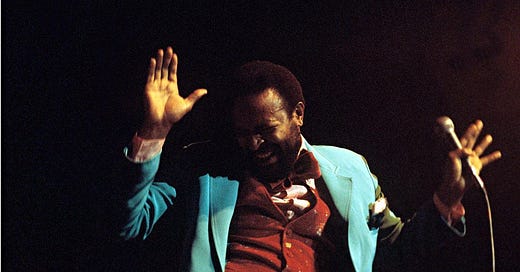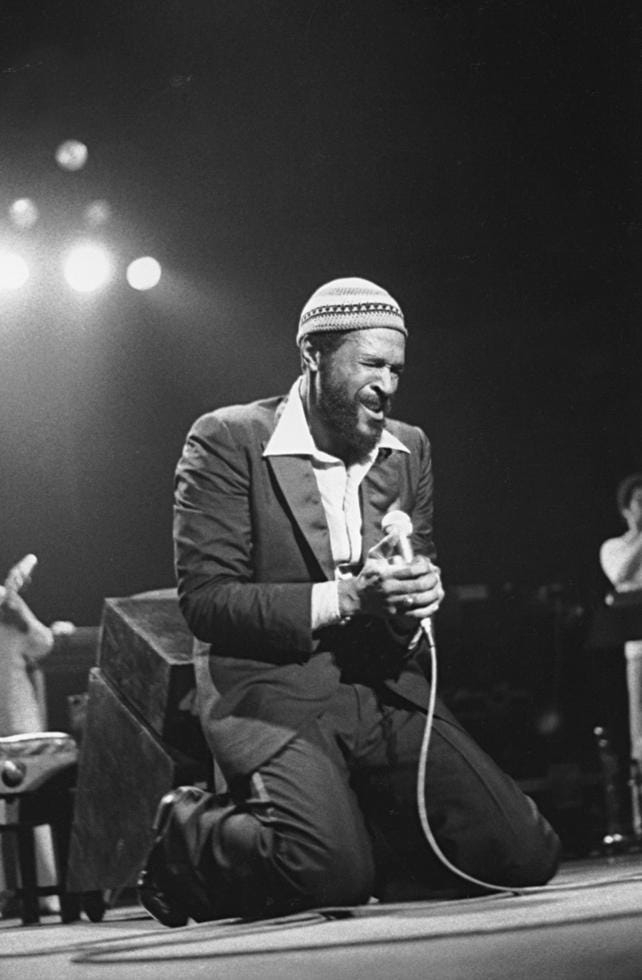But no real artist will be comfortable delivering raw materials— Gwendolyn Brooks
“Cleo’s Apartment,” (1972) by Marvin Gaye is 2 minutes and 9 seconds of nihilistic yearning transmuted to cascading drums and long adagio moans, it's ballad for voice with no singing. It’s part of his soundtrack for Trouble Man, a film by Ivan Dixon that follows the typical blaxploitation format of its era— black detectives, hoodrich criminals, endless chase scenes lulling our minds into sepia hued thinking (a kind of nostalgia of the present) and the dilute intrigue of ghetto come-ups. “Cleo’s Apartment” is extrajudicial, it exceeds the film and the laws of song and marks its own territory which is no place and swooning on the untraceable axis between absence and nonsense. And it reaches this illusive nerve center without the deliberate halfway feeling of an intentional interlude, by instead making an autonomous zone out of unnameable agony, yearning, and praise, an escape room that you don’t escape, where you retreat to suffer outside of time so that you can prove your self-discipline in other contexts.
Restraint is the balm that coerces us into the arms of our fantasies by making us feel mature and deserving. Acts of restraint are often inverted daydreams, escapes of their own, withheld so we can get back to them later when we have time to be spellbound. We set up a sublime expectation by pretending to curtail a desire we are just postponing or nurturing, and the fulfillment of that desire becomes more and more inevitable the longer it’s withheld. Moans and sighs are a song’s version of nurturing through withholding—downcast vocal shudders that give the denied feeling a place to occupy, the voice in this case, an ominous and rejoicing place unsure whether to praise or sulk.
“Cleo’s Apartment” is the sunken place, that zone where black emotionalism is dark unto itself, and its helpless abjection becomes the root of its vastness. It’s the crossroads where arousal so strong it’s incomprehensible and the rest of the scene blurs and shutters to make way for temptation’s precision and single-minded intent. I want it now, the tone confesses, and not yet it withholds, not yet. Then the moans beg and curl into closeness mimicking the resolution of a longing or the love of unresolved longing, that hedonism of prolonged desire as it becomes disaster or obsession or numb when in limbo for too long. There are glints of doo wop in the moaned conversation Gaye has with himself and his muses here, and you can picture a soulful trio, slick in well-tailored powder blue suits and ruffled blouses, and they’re swooping a slow, slanted two step and clapping off beat on purpose to undo the symmetry of their uniforms and train the mind to pursue disruptive intervals, intervals that alter being. The moaner wants to confess something that he’s not allowed to divulge, a secret love or a private enmity that has become so strong it’s almost erotic with thin line haptics.
Marvin Gaye was disastrously gifted. He was too beautiful and his voice was, and he was too obedient to the resentments of others, and to his own vain torment. Maybe he was an hysteric, too fragile, too capable of love and devotion, too ready to deviate into betrayal and estrangement when his love was threatened, too frayed, too free, a freak mistaken for an angel, at least in his own eyes he was monstrous at times. He attempted suicide on three different occasions, and some say he accomplished it the fourth attempt, that he had goaded his father into killing him because he couldn’t do it himself, that his last words, spoken to his brother, confessed this. It’s really too much, the kind of excess of trauma bonding that has to leave coherent speech and moan to communicate itself—trauma resonance. The literal would be false and fall short in this realm; this man’s story has to revert to wordless utterance to be clarified. Detail becomes irrelevant when confession is this unspeakable and gaudy, one just has to tell it, undeflected by logic and grammar. One has to get lost and harbor the frequency of loss like a superpower tangent to the power of those who have nothing to lose, everything to give. Such pathological giving will kill you and an opposite but equal quotient of withholding and withdrawal from the world will do the same. Marvin’s life loomed in the purgatory between giving too much and giving up— in fame and infamy, gorgeous and petrified in the true sense of the word, held up by all his beauty manifest as skill to both exceed and devour himself.
—
I’m not, as it’s been said some are, weary of “trauma plots” but I am bored with the pathos of trauma, to such an extent that sometimes I even run out of empathy for myself. I call this exhaustion with agony and agonized posturing forgiveness, because it culminates there or no where. Either you forgive that final stage of trauma: ennui with the story and all of its characters, or it will consume you alive. What element of the trauma fatigue are we forgiving or being asked to forgive? The unsayable hovering and bolted as a blank shield between the known and the felt.
The task at hand is to stop assuming that all trauma leads to pain or weakness and can be capitalized on as such. Discarding this assumptions help us to avoid making pain our grift. What of the traumatic event that leaves you restless with enthusiasm for what’s next, energized with adrenaline, and then renewed instead of scarred, calculating and alert where you expected to be murky with dejection, liberated from some lie that the copacetic was perpetuating. What of the bliss of overcoming? Have we lost access to those registers due to rituals that commemorate the tragic over the cathartic? Singing without lyrics, suffering without pain, trauma beyond pathos, turning the traumatic adventurous or existential, and overcoming addictions to noble suffering— I think these are the next phases in the healing of the collective subconscious. But the words we’re stuck in have their built-in biases and coax us back into the habit of wallowing, even the verb tenses which enclose past present and future as if they are fixed and not interchangeable do this. We forget that our current outlook can change the past, that memory is as imaginative as fiction. We forget how to selectively forget and edit and undo the sad parts, not deny them or disinform ourselves, but call former events by new names in order to achieve reconciliation between then and now. A new name is a new event. The unnamed are shameful zombies who never quite go missing. The old names and stories are cemeteries.
—
When you must stop speaking but cannot stop singing, “Cleo’s Apartment” is the heartsound you’re left with, the emotions at bay and encroaching, tidal swollen and eager to crest as mood and temperament. It seems like Marvin Gaye was good at eroticisizng his sorrow, indulging it through hypersexualization of his impulses. He didn’t always feel worthy of the ambiguity that guided some his most stunning instincts. He couldn’t even dance suavely to his own music. Awkward self-conscious thrusts took the place of swagger in the spotlight, intense asymmetrical gyrating confusing his siren singing. His sex appeal was well sold but lopsided and shaded with neediness. And his tenderness felt more wounded than protective, like it needed attention the way a child needs attention after a fall. And his assassination, infinitely foreshadowed and infinitely inconclusive, has no requiem but a courtroom drama. The void he left became his elegy, a requiem of shock and gasp, and “Cleo’s Apartment” becomes a spiritual to help fill that chasm, to be hummed in remembrance of him after he’s gone because it’s easier to recount the story tonally than with neat and alphabet-bound details.
The etymology of assassination tells us it derives from the word hashish, as if the act itself the consequence of a drug-induced stupor, of getting a little too high and being shot down for one’s own good or the good of those who can’t bear to live in the hell beneath you, jealous bigots and the like. Scorned fathers who think injuring you might teach you a valuable lesson, or tell themselves, like rapists might, that you asked for it by the way you carried yourself, by the fact that you allowed yourself to be perceived or formed by them at all. That plot needs destroying, it’s replete with potholes in a roadless diction whose terrain is violent intervention. It needs to be infiltrated with decent music, appalled music, music that cannot be erased by the aphasiac breakdown of relations and concepts within it. Phraseless slowdown tonalities. Hope’s immortal falsetto downcast as April snow in a place invented by one of the top fifty worst movies of all time, as Trouble Man was once rated. We should be ashamed for conjuring sex symbols of abused men but it’s a common cycle and makes sense because getting out of trouble sometimes requires getting into a new version of trouble, upgrading your masochism. Marvin Gaye escaped domestic tyranny for a time, but behaved as someone who believed he deserved to be punished repeatedly, for some arbitrary set of transgressions he wasn’t even sure he had committed. He seemed like someone who always felt guilty and ashamed of himself until was ultimately ravaged by the conflation of lust and revenge for that feeling, and by an underlying vengeance for himself.
When I first heard “Cleo’s Apartment” I was stunned by its gallop from anticipation to dread and back, an affair reenacted in the texture of a slow dance that collapses in on itself, frenzies rapidly, then almost becomes legible before it’s guillotined like a heretic for using clearly slurred words. What’s bonded within it is a mixture of shame and awe, the way men shake their heads when the see unattainable beauty walking by or recall it in the mind, the way it feels to have loved so deeply it’s embarrassing and grotesque, or the way it feels to witness someone’s killing on loop in the mind, figurative or otherwise, false start or falsettoed into ripple, almost so deeply jarring you laugh but gulp the laugh with a moan. There’s an unconsolable quality in Gaye’s singing that surfaces in his life and its haunting final note. It’s as if he was trying to escape a doomed resonance, one too entangled with the villains he couldn’t help but love. It’s rude to treat circumstances so disturbed and disturbing as parable, and we’re afraid of myths that come true. It’s safer to say, “Cleo’s Apartment” is Mavin Gaye’s most autobiographical song, his least compartmentalized song. All of his demagogy and symbolism falls away within it, he squeals at the missing shtick, and almost descends into madness in exchange for the chance to be so honest. Then he leaves, hushed by his loyalty to his own pain, and walks in the direction of the silence that will deepen it. The place the song invents exists in every mind, it’s where you go to get lost on purpose, to whore yourself out to be seen as mysterious, to return to the intimacy of unknowns, and condemn anyone who would try and deter you from going back to that opium den of the spirit. It’s frightening how seductive this perfect terrible mythic region is, how close to deliverance it gets just to restate the silent ultimatum which lies and dictates that the greatest singers must be martyrs.






scary and beautiful -- your writing, not just the music. you think like Charlie Parker played.
Excellent! Maybe Curtis next time?